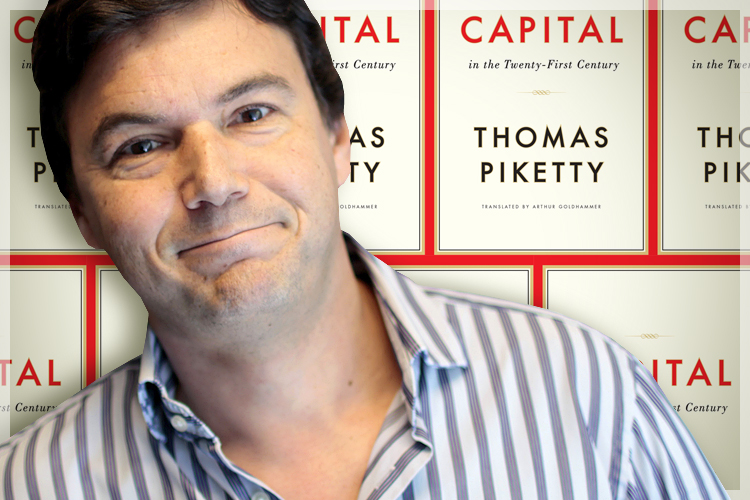Tomorrow is April 15, otherwise known as tax day in the United States. And as I’ve been reading Thomas Piketty’s Capital in the Twenty-First Century (Cambridge, MA: Harvard University Press, 2014), I have come to believe that Catholics need to keep talking about the importance of taxes. For those of you who have not read Piketty’s book, which is a dense 685-page economics text, I’ll quickly summarize. Piketty argues that inequality is on the rise and that this has destabilizing effects. As the title of the book suggests, he is particularly concerned with capital income. Both Europe and the United States have high levels of capital inequality, with the top 10% owning 60% of all capital in Europe and 70% of all capital in the United States (Table 7.2 of Piketty’s book). Piketty argues that in the United States, rapid capital accumulation has occurred for the top 1% not only because of inherited wealth but also because of the extraordinarily high wages earned by the highest earners (Table 8.8). Piketty proposes a global tax on capital.
Much has been written in response to Piketty’s thesis, and the conversation continues. Economists point out that it is difficult to predict the future with any degree of certainty. My USD colleague Ryan Ratcliffe explained in a panel discussion at USD that mathematical models are helpful, but we need to remember that we are discussing human behaviors. Measurements of capital are imprecise and always in flux. Piketty would not dispute this. But Piketty criticizes economists for failing to analyze the available data (tax records, etc), and his publications have focused on the problem of inequalities. He worries that we are returning to patrimonial capitalism, and that this has negative impacts on democratic institutions and goodwill among citizens.
Piketty’s analysis coheres with Catholic Social Thought’s attempt to persuade; the documents of Catholic Social Thought are addressed not only to Catholics but to all people of good will. As Piketty writes, it would be a shame to leave this to the economists to sort out all by themselves. It is of interest to everyone. That means you and me too.
Another piece of Catholic analysis that resonates with Piketty’s method is his insistence on getting the data. This, too, resonates with a Catholic approach to complex moral dilemmas. In the Catholic tradition, faith and reason go hand-in-hand. Good ethics is based on good data.
Not surprisingly, there is much overlap in the concerns of Catholic leaders and the implications of Piketty’s analysis. Try to guess which of the following claims are drawn from Piketty’s economics book, and which come from a document of Catholic social thought. We’ll call this game “Piketty …or a pope?”
a.“Basic rights and material advantages must be extended insofar as possible to everyone, as long as it is in the interest of those who have the fewest rights and opportunities to do so.”
b. “I am interested in contributing to the debate about the best way to organize society and the most appropriate institutions and policies to achieve a just social order.”
c. “It is the duty of the public authority to prevent and punish injury and to protect each one in the possession of his rights.”
d. “The goods of this world are equally meant for all. The right to private property is valid and necessary, but it does not nullify the value of this principle. Private property, in fact, is under a social mortgage.”
e. “In the face of the unrelenting growth of global interdependence, there is a strongly felt need, even in the midst of a global recession, for a reform of the United Nations Organization, and likewise of economic institutions and international finance, so that the concept of the family of nations can acquire real teeth.”
Answers: a. Piketty! (Capital in the Twenty-first Century, pg. 480); b. Piketty! (Capital 31); c. Pope! Pope Leo XIII, Rerum Novarum (1890), no. 29; d. Pope! Pope John Paul II, Sollicitudo Rei Socialis, no. 42; e. Pope! Pope Benedict XVI, Caritas in veritate (2009), no. 67.
Piketty does not draw on Catholic social teaching at all in making his ethical claims about the importance of increased taxation to serve the common good. But he could. Catholic social teaching refers to the authoritative documents of the Catholic Church that deal with social issues. These documents are global in scope, are concerned with social justice and social stability, and focus especially on care for those most vulnerable (which often means concern for those most impoverished). Catholic social teaching is indebted to the same traditions named frequently by Piketty in his analysis: reflection on Enlightenment thinking (as demonstrated especially in political philosophy), and concern for those made vulnerable in the wake of the Industrial revolution. The Industrial Revolution and influence of market capitalism led in the 19th century to the exploitation of urban workers who had no real rights– no minimum wage, no laws limiting working hours, no right to organize/unionize, no disability insurance, and no protection against unemployment. Catholic teaching at the time rejected the determinism and materialism of Marxist thought but tried to take a middle ground approach between capitalism and socialism as it responded to the plight of workers. The first document to do this was Pope Leo XIII’s Rerum Novarum, published in 1890. In Rerum Novarum, Pope Leo XIII recognized the legitimacy of private property, defended the just wage, defended the right of workers to organize in unions, and moved the church to the “side of the poor” against the oppressions they faced. In Rerum Novarum, the pope argued that human labor cannot be treated as a commodity because that denies human dignity and reduces the worker to the status of a thing. Over time, later popes developed some of these main ideas. For example, in CST, the state has an important role to play to promote social stability and to protect the poor. These concerns bubble up frequently in Piketty’s analysis, even though he does not engage the documentary heritage of Roman Catholic ethics.
Jesuit and moral theoloigan Thomas Massaro has eloquently argued in his book, Living Justice: Catholic Social Teaching in Action, that a Catholic perspective always recognizes that the rights of the individual are in tension with the requirements of the common good. Massaro explains that a true respect for the common good suggests that the material things necessary for a good life should be widely available for use by the whole community. But the Catholic tradition also testifies to the benefits of individual ownership, which not only encourages the most efficient and orderly arrangements of material goods but also offers people an incentive to be productive and to care for the goods God has created. (Massaro, 92).
Massaro explains that the popes have consistently issued stern warnings against unlimited acquisition of wealth and inordinate concentrations of power. As we saw with the quotation from Pope John Paul II, to say that our property comes under a social mortgage means that we cannot disregard the needs of the less fortunate, or amass property in a disproportionate way that would harm others, or accummulate so much wealth that we exclude others from full participation in society. To pay attention to these authoritative texts of the tradition means that Catholics should feel uncomfortable with an economic system where ability to pay is the only legitimate claim to vital goods for human flourishing (food, housing, health care, etc). Which is why I think you can see considerable overlap between CST and Piketty’s thesis. Piketty writes:
“A market economy based on private property, if left to itself, contains powerful forces of convergence, associated in particular with the diffusion of knowledge and skills; but it also contains powerful forces of divergence, which are potentially threatening to democratic societies and to the values of social justice on which they are based…. The problem is enormous, and there is no simple solution.” (571-572)
I think you will see in this summary that Piketty’s thesis is eerily similar to Pope Benedict’s thesis in Caritas in Veritate.
“Through the systemic increase of social inequality, both within a single country and between the populations of different countries (i.e. the massive increase in relative poverty), not only does social cohesion suffer, thereby placing democracy at risk, but so too does the economy, through the progressive erosion of social capital: the network of relationships of trust, dependability, and respect for rules, all of which are indispensable for any form of civil coexistence.” —Caritas in veritate (2009), no. 32
There is considerable overlap between Catholic teachings and Piketty’s analysis. Piketty argues for an economy that serves the common good, not just the top 20%, top 10%, or even the top 1%. Piketty is concerned for the stability of democratic institutions and wants to limit the ways in which the rich can unduly influence politics. Piketty supports the social state. He wants poor children to have the same access to health care, education, and other basic goods for human flourishing as the children of the wealthy. He wants our economy to be more fair. Taxes can be one mechanism to achieve greater fairness. Taxes alone are not the answer, but taxes must be part of the answer. What Piketty’s book does is to highlight the need for a robust conversation on the importance of equitable taxation that serves the common good.
Unfortunately, Piketty’s analysis faces the same dilemma faced by the popes. And this is a serious matter, for which I do not have easy answers. I believe Piketty’s proposal of a progressive global tax on capital would be welcomed by the popes, as I interpret the documents of Catholic social thought. The progressive global tax on capital clearly aligns with the values of Catholic teachings. The problem, of course, is that even Piketty says this is “no doubt a utopian ideal.” Perhaps we should start with smaller steps: greater regulation of particular markets, greater transparency in government institutions, campaign finance reform with teeth… etc… No doubt, this should keep us plenty busy. But as we move forward, I think it is important to avoid simplistic complaints about paying taxes. Paying taxes is part of what it means to be a citizen. If you ate fruit grown in the United States today, or drove on a paved road, or consumed a medicine, or breathed clean air, or drank clean water from your tap, you benefited from the mechanism of taxation. Catholic social teachings remind us that we are social creatures by nature, and that we are part of an interdependent human community. Paying taxes can provide a gentle reminder of your obligations to that human community.



